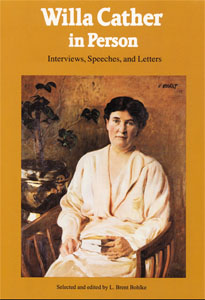from Willa Cather in Person: Interviews, Speeches, and Letters
Selected and edited by L. Brent Bohlke
Lincoln & London: University of Nebraska Press, 1986
1905: NEW YORK
The publication of Willa Cather's book, The Troll Garden, was the next occasion on which she was put in a public spotlight. She was also at the beginning of a new career at McClure's, a career brought about largely by the stories in her second book. The reviewer is less concerned with biographical detail than with the author's method of creating fiction, particularly in the instance of "Paul's Case." The article, accompanied by a picture of Miss Cather, is the first to quote her directly.
MISS CATHER
Miss Willa S. Cather, whose book The Troll Garden has caused a good deal of discussion, began her literary career, like many authors, at an early age. When eight or nine years old, according to a man who knew her as a child in Virginia, she not only wrote a play, but arranged and supervised its performance with remarkable effect. Shortly after that period her family took her to Nebraska, where she lived for a while a healthful, quite unliterary life, spending most of her time in the open on horseback. Graduating at the University of Nebraska, she became correspondent for several newspapers, wrote, and in 1903 published, a volume of verse called April Twilights, and then took to writing the stories which have now been gathered in book form. In Pittsburg, where Miss Cather is living there was a foundation of fact for the incident around which she built her story of "Paul's Case." Two boys employed by a firm that managed a large estate ran away with two thousand dollars. They were found at the Auditorium Hotel in Chicago about ten days later, their money gone, and they were brought home. The papers were full of the affair for a time, but as one of the boys was a minister's son, and as the money was refunded, the firm did not prosecute. This story, of all the stories in the book, comes nearest to being based on actual occurrences; so that Miss Cather's psychology is all the more a remarkable attainment. There may be deduced a certain endorsement of her accuracy from the fact that concerning these accounts of hers of abnormal artistic personalities she receives in her mail a regular succession of such outpourings as have caused her to exclaim, "I never knew before there were so many madmen at large." Miss Cather herself is a hard-headed, clear-visioned, straight-forward young woman.
"Chronicle and Comment," Bookman, July 1905.
